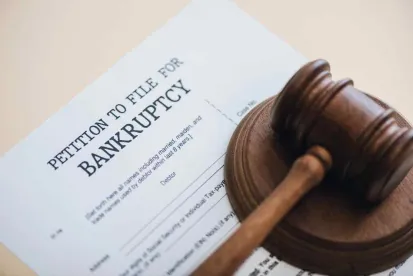In a recent opinion from the United States Bankruptcy Court for the Eastern District of California, Judge Christopher Klein sanctioned a decedent’s estate’s representative and its lawyer for frivolously and repeatedly misrepresenting the estate’s eligibility to be a debtor, citing conduct that rose to the “level of insouciant defiance.” Judge Klein made clear that the sanctions were also intended as a warning to others in light of the recent popularity of improper decedent’s estate cases, all of which were dismissed without payment of the filing fees.
In In re Estate of Taplin, Ernest Von, --- B.R. ---, 2022 WL 1799292 (E.D. Cal. 2022), the decedent died intestate, leaving his son as his heir. While in prison, the son gave his mother power of attorney to handle his father’s probate matters. The estate’s lawyer, David Foyil, petitioned the probate court to appoint the imprisoned son’s mother as special administrator of the estate for the express purpose of filing a chapter 11 bankruptcy case to stay foreclosure of the decedent’s home.
On the same day that the probate court granted the appointment request, Mr. Foyil, on behalf of the decedent’s estate, filed a chapter 11 petition. Because the estate self-identified as a “corporation” on the petition, the bankruptcy court issued a show cause to both the debtor and to Mr. Foyil to explain why filing the petition did not violate Federal Rule of Bankruptcy Procedure 9011(b).
The debtor’s written response relied on the state probate court’s order appointing a special administrator. In a declaration attached to the response, Mr. Foyil excused his allegation that the decedent’s estate is a corporation as use of an “incorrect form . . . incorrectly identifying the debtor as a business entity, specifically a corporation.” In a purported effort to correct the issue, Mr. Foyil filed a “facially (and farcically) incorrect” amended petition, identifying the decedent’s estate as a small business debtor that was required to file periodic reports with the Securities and Exchange Commission.
The court, refusing to accept the unconvincing charade, dismissed the case and sanctioned both Mr. Foyil and the estate’s administrator because, according to Judge Klein, “the nonsense need[ed] to stop.” After concluding that a decedent’s estate is ineligible for bankruptcy relief, the court conducted a painstaking analysis of Rule 9011 and the parties’ violations thereof.
According to Rule 9011(b), the filing of a bankruptcy petition is a certification that it is presented for a proper purpose and supported by existing law or a nonfrivolous argument for changing existing law. These representations are based on “the best of the person’s knowledge, information, and belief, formed after an inquiry reasonable under the circumstances.”
Rule 9011(b)(1) prohibits filings made for “any improper purpose, such as to harass or to cause unnecessary delay or needless increase in the cost of litigation.” Although necessary and proper for legitimate debtors seeking bankruptcy relief, the delay imposed by the automatic stay becomes “unnecessary” under Rule 9011 “whenever a case is filed respecting an entity that is not eligible to be a debtor under any Bankruptcy Code chapter.”
Mr. Foyil, who had filed more than 2,000 bankruptcy cases since 1996, admitted in open court that he had not made any inquiry into the question of eligibility of a decedent’s estate to be a debtor under the Bankruptcy Code – neither before nor after the court issued the order to show cause.
The court sanctioned Mr. Foyil a total of $10,000, which consisted of forfeiture of his $4,000 retainer fee; $4,000 for violations of Rule 9001(b) (i.e., filing the original petition, described by the court as Mr. Foyil’s “initial disregard of Rule 9011,” and “later advocating” the “same frivolity” in an amended petition); and $2,000 to deter further repetition of similar conduct. The court also sanctioned the estate’s administrator $2,000 for violating Rule 9011(b) by filing the original petition; $2,000 to deter other prospective special representatives and their attorneys in probate court; and ordering disgorgement of the $4,000 retainer fee into the court instead of refunded. Judge Klein commented that the parties’ timing was unfortunate in light of the “parade of seventeen decedent’s estate cases” and the “abusive pattern” of cases being filed without ever paying the filing fee.
Judge Klein’s Taplin decision should serve as a strong warning to attorneys and debtors alike: if a judge issues a show cause order questioning a debtor’s eligibility, it would be wise to, at the very least, do a quick Google search on the issue (particularly if you are in the Eastern District of California).




 />i
/>i
